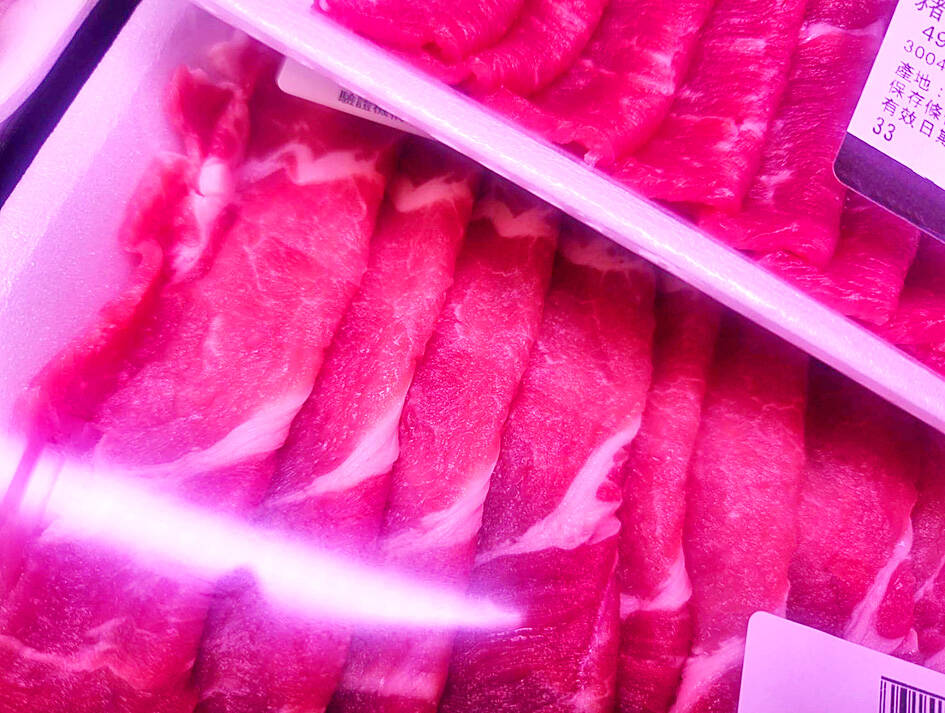The Food and Drug Administration (FDA) on Saturday evening announced that border inspections on imported pork would be conducted for every batch, taking effect immediately, as two local importers were recently found to have falsely labeled pork imported from the US as being from other countries.
The Taoyuan Department of Public Health on Wednesday said that it, with the FDA, inspected pork by Hsin Hsing Frozen Food Co (新興冷凍食品) and Rayton Foods Co (瑞騰國際), and found the two companies were suspected of falsely labeling pork products.
Hsin Hsing Frozen Food Co since late June imported up to 4,633 packages (94,377kg) of frozen pork shoulder from the US and sold them as hot pot pork slices, but labeled them as being from Canada.

Photo: CNA
Rayton Foods Co in July and last month imported about 47,164kg of frozen pork collar butt from the US, and sold it as “restructured pork slices,” while falsely labeling them as being from Canada or from the UK.
As the maximum residue limits of ractopamine, a leanness-enhancing feed additive used in pigs and cattle, was set in 2020, and imports of pork from ractopamine-fed pigs were allowed in Taiwan from Jan. 1, 2021, the FDA requires all food products containing pork to declare the country of origin.
The FDA on Thursday evening said the imported pork from the two companies was tested for ractopamine residues, and the test results were negative.
The Taichung City Government on Friday released a list of 81 restaurants that purchased and served the falsely labeled pork from the two companies, while local governments also conducted follow-up inspections on the restaurants that used it, but did not publicize the restaurants’ names.
The Taipei City Department of Health on Friday said it found one restaurant failed to mark the source of its pork products and four restaurants falsely labeled imported pork from Canada or the US as being from Taiwan, Canada or Spain.
The New Taipei City Department of Health yesterday said it found three restaurants that failed to mark the source of their pork products and four restaurants with false labeling.
Batch-by-batch border inspection was initially conducted on imported pork when meat products from ractopamine-fed pigs were first allowed to be imported in early 2021, but as no ractopamine residues were detected in two years, the inspection rate was decreased, FDA Director-General Wu Shou-mei (吳秀梅) said on Saturday evening.
As there is a public concern about imported pork, the FDA has decided to restore batch-by-batch border inspections on all imported pork immediately, no matter the product’s country of origin, she said.
Additional report by CNA

Three batches of banana sauce imported from the Philippines were intercepted at the border after they were found to contain the banned industrial dye Orange G, the Food and Drug Administration (FDA) said yesterday. From today through Sept. 2 next year, all seasoning sauces from the Philippines are to be subject to the FDA’s strictest border inspection, meaning 100 percent testing for illegal dyes before entry is allowed, it said in a statement. Orange G is an industrial coloring agent that is not permitted for food use in Taiwan or internationally, said Cheng Wei-chih (鄭維智), head of the FDA’s Northern Center for

LOOKING NORTH: The base would enhance the military’s awareness of activities in the Bashi Channel, which China Coast Guard ships have been frequenting, an expert said The Philippine Navy on Thursday last week inaugurated a forward operating base in the country’s northern most province of Batanes, which at 185km from Taiwan would be strategically important in a military conflict in the Taiwan Strait. The Philippine Daily Inquirer quoted Northern Luzon Command Commander Lieutenant General Fernyl Buca as saying that the base in Mahatao would bolster the country’s northern defenses and response capabilities. The base is also a response to the “irregular presence this month of armed” of China Coast Guard vessels frequenting the Bashi Channel in the Luzon Strait just south of Taiwan, the paper reported, citing a

The Chinese military has built landing bridge ships designed to expand its amphibious options for a potential assault on Taiwan, but their combat effectiveness is limited due to their high vulnerability, a defense expert said in an analysis published on Monday. Shen Ming-shih (沈明室), a research fellow at the Institute for National Defense and Security Research, said that the deployment of such vessels as part of the Chinese People’s Liberation Army (PLA) Navy’s East Sea Fleet signals a strong focus on Taiwan. However, the ships are highly vulnerable to precision strikes, which means they could be destroyed before they achieve their intended

UNDER PRESSURE: The report cited numerous events that have happened this year to show increased coercion from China, such as military drills and legal threats The Chinese Communist Party (CCP) aims to reinforce its “one China” principle and the idea that Taiwan belongs to the People’s Republic of China by hosting celebratory events this year for the 80th anniversary of the end of World War II, the “retrocession” of Taiwan and the establishment of the UN, the Mainland Affairs Council (MAC) said in its latest report to the Legislative Yuan. Taking advantage of the significant anniversaries, Chinese officials are attempting to assert China’s sovereignty over Taiwan through interviews with international news media and cross-strait exchange events, the report said. Beijing intends to reinforce its “one China” principle